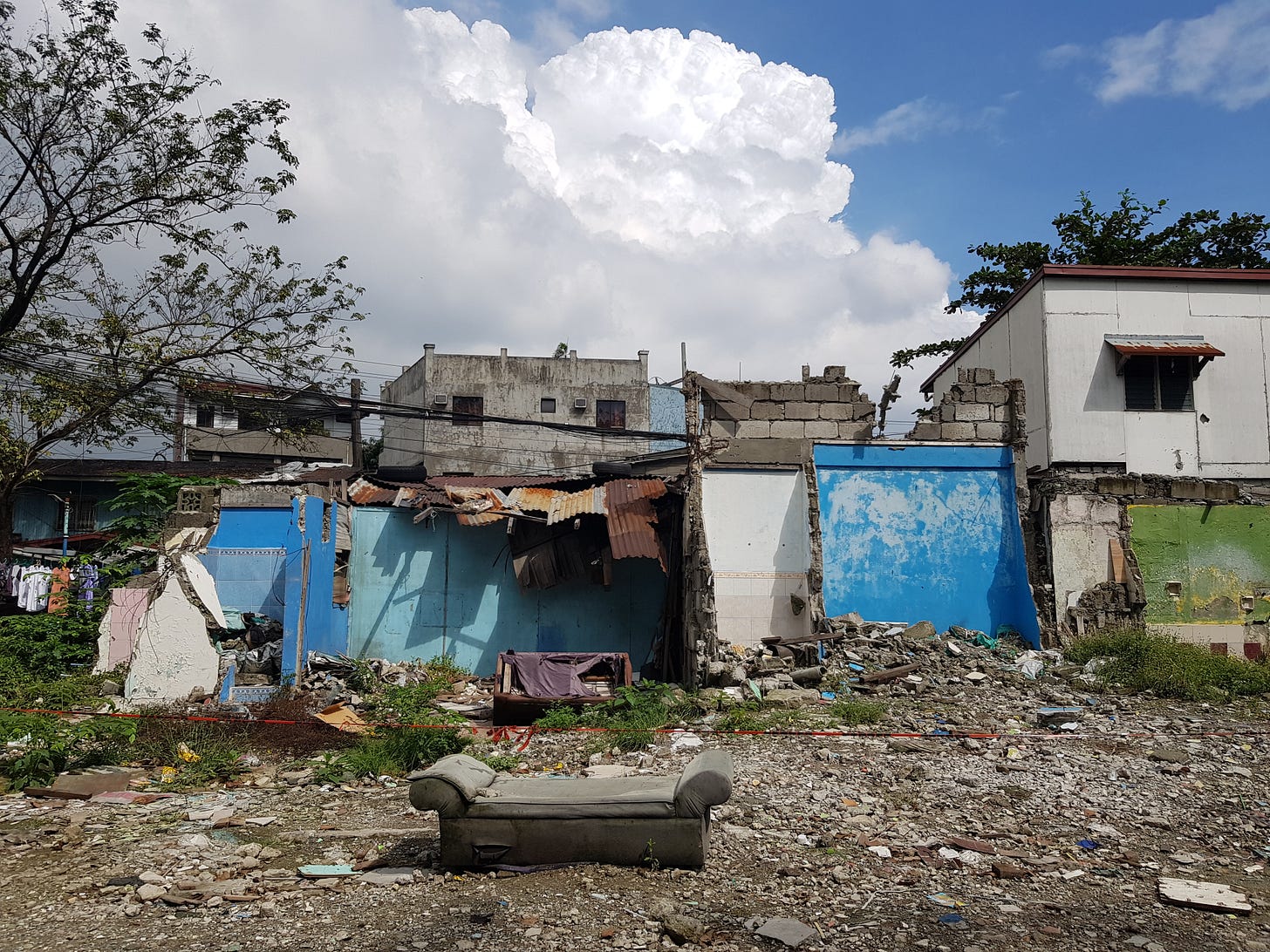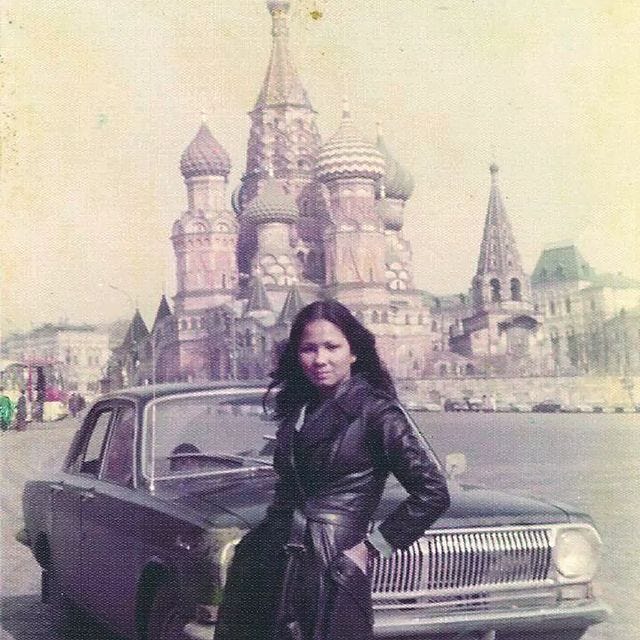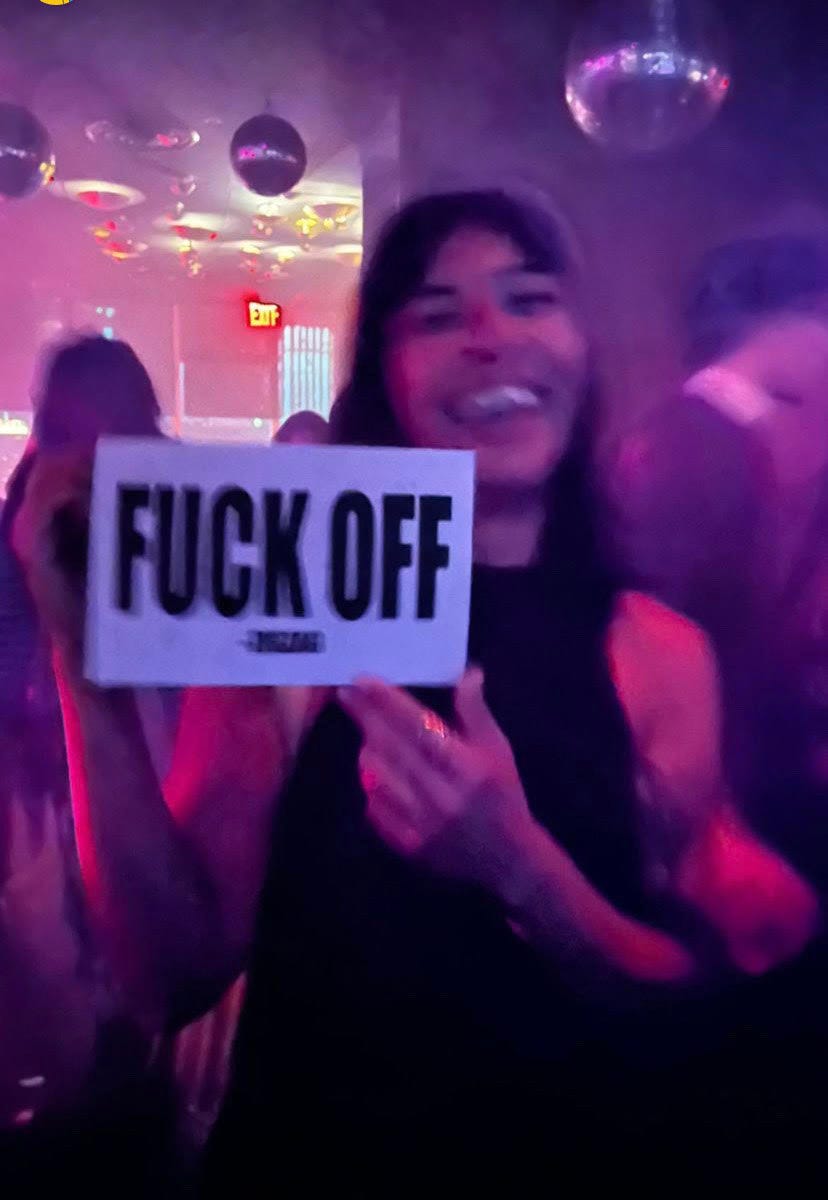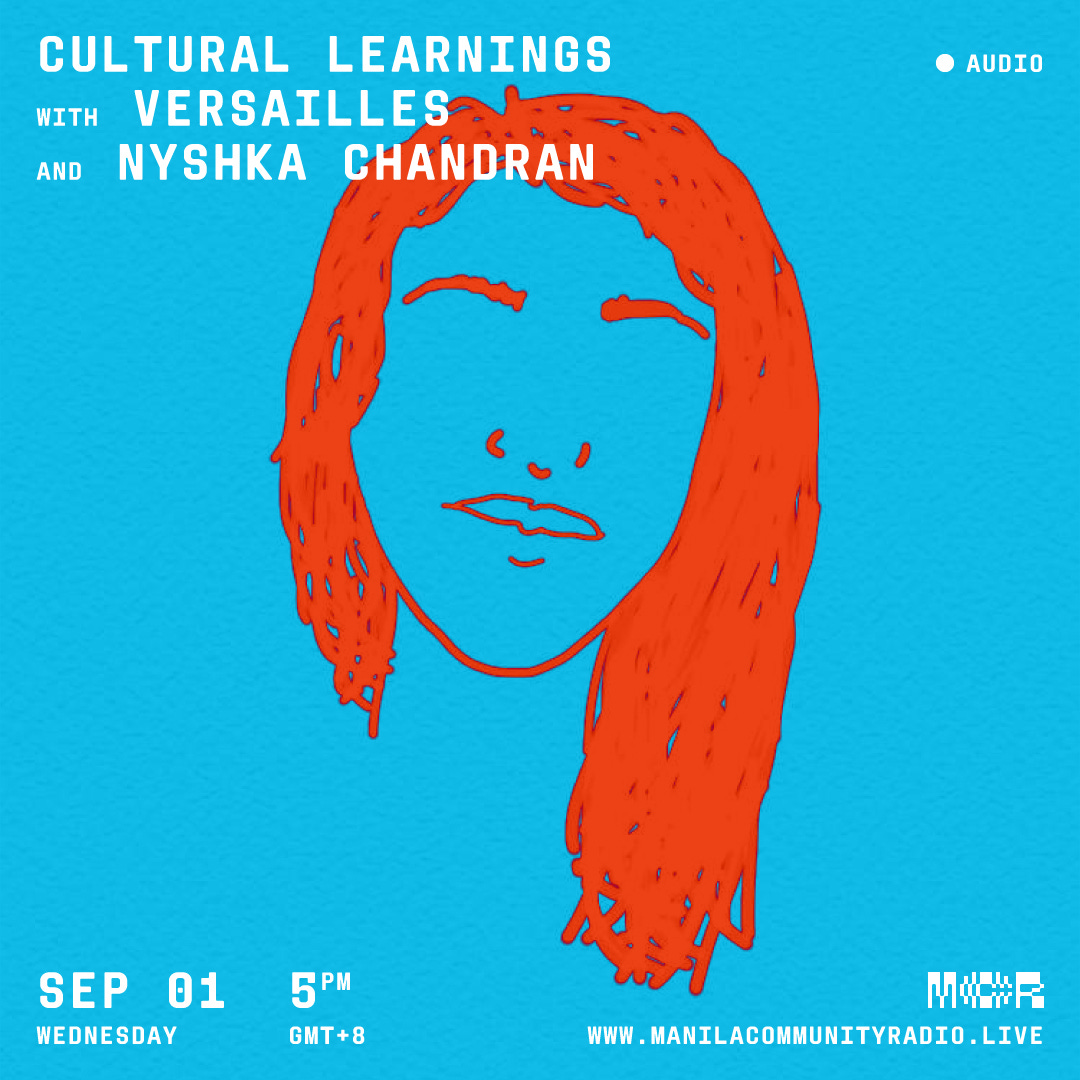How do you process experience?
On thinking fast and slow with journalist Nyshka Chandran, plus the best of 2021.
Cultural Learnings is an editorial platform for discussions on contemporary culture, curated by Sai Versailles. You can support it by subscribing to this newsletter, sharing it with your friends, emailing your thoughts, or answering this survey.
Cultural Learnings is also a monthly themed radio show of eclectic music selections on Manila Community Radio. You can access the radio archive here.

TUESDAY, 20 DECEMBER 2021
I’ve been struggling to process things recently. I don’t know if that’s the nature of consciousness … Maybe I’m really distracted … I feel like I’m stalling the emotional response to the point of repression.
This is an excerpt from a diary entry I wrote a few days ago on my typewriter. On December 16, Typhoon Rai (locally known in the Philippines as “Typhoon Odette”) made initial rainfall on Siargao Island, reaching maximum sustained winds of up to 200-kilometers per hour.
For the days that followed, the typhoon swept across other parts of the Mindanao and Visayas region, causing destruction along its path. My feeds erupted with visceral images – palm trees tilted by the torrential rain where the water was no longer pouring vertically, but speeding horizontally. Siargao is a remote island where the nearest hospital is a boat ride away. All communication lines were destroyed, and the only photos I saw on the web were from people who evacuated to the mainland where there was cellular service. I didn’t hear from my friends for nearly a week.
I have a strong connection with Siargao, especially around this time of year. I visited the island for the first time on January 1, 2020, and I still feel that jolt of electricity whenever I talk about my experience there. It was one of the most beautiful and healing places I’ve ever been to, and I yearned all year to return. Mourning the loss of a place like Siargao is a strange thing. Aldo Leopold described “ecological grief” in his 1949 book, A Sand County Almanac:
One of the penalties of an ecological education is that one lives alone in a world of wounds. Much of the damage inflicted on land is quite invisible to laymen. An ecologist must either harden his shell and make believe that the consequences of science are none of his business, or he must be the doctor who sees the marks of death in a community that believes itself well and does not want to be told otherwise.
I’ve been thinking about what my excerpt conjures, and I believe it’s a feeling of edginess around the fact that my ability to process experiences is stunted by heavy grief. On the same entry, I wrote about how my mom passed away last September – an “impending death” I “was already preparing so long ago.” These days, I’m noticeably numb to her memory, which raised in me a moral questioning. “Maybe I’m hung up on the torment of whether I’ve given my mom’s death as much thought as the other things I’ve lost,” I said.
Even now, as I construct this sentence, I struggle to convey to you how this punctures me. Does the immediacy of a person have anything to do with how much emotion I express in grief? Will my trauma response outweigh my memory of her? I spoke to my mom for ten minutes on the day she died – the first time in nearly two years. I spent the days following her death noting down indelible images in my head, like “a dark room, draped in curtains and lit by a small lamp.” I continued:
I spent three nights there, sleepless from the rumblings of his bellow. My mom held me in her arms, while he slammed his palms on her temples. One morning, I found him dragging her on the kitchen floor after taking the car out in haste. Those three nights haunted the rest of my life. Days of rage were followed by silent evenings, then momentary seasons of peace.
What I can say for sure is that writing, more than anything, helps process my experiences – whatever that means, since writing is also fixed by how the light shines to shift a mood. I’m currently reading Joan Didion’s book The White Album for the first time, and I found this quote to be very apt:
We look for the sermon in the suicide, for the social or moral lesson in the murder of five. We interpret what we see, select the most workable of the multiple choicer. We live entirely, especially if we are writers, by the imposition of a narrative line upon disparate images, by the “ideas” with which we have learned to freeze the shifting phantasmagoria which is our actual experience.
Below is an interview I had with Nyshka Chandran last August, a few days before we broadcasted her show on Cultural Learnings. She is a freelance journalist with bylines on Resident Advisor, BBC, and Al Jazeera, among others. We stumbled upon each other on the internet and have mused on nightlife and club culture this past year.
You are about to read our first proper conversation, held on Zoom. I’m really glad I let this simmer – as if time needed to endure, just a bit more, to feel the weight of how we got here.
The following interview was condensed for clarity.
So, you’re in Toronto now. What have you been up to these days?
I’ve been moving around a lot, so I'm enjoying being still in a place where I don't have to think. It's nice to be back. My parents live here so I’d come visit, but I haven't spent much time in Toronto. It all feels new to me. Hopefully now that the city is open, I can rediscover this place I used to live in. Just last weekend, I caught one of my first club gigs [since the pandemic]. An all-star Toronto line-up, all my favorite DJs. But it was a weird reopening. The crowd was flat, you would have never known Toronto's returned to nightlife.
When was the last time you were there?
The last time I lived here was between 2006 and 2010.
Where did you live before then?
I don't really have a "home." I'm one of those, unfortunately, nomadic species. [My family] has been moving every four years. Before the pandemic, I lived in Kuala Lumpur for nine months, to test it out. Before that, seven years in Singapore, Canada for university, then I grew up as a kid between India, Dubai, and Tokyo.
I empathise with you being back in Toronto. I’ve known Manila all my life and when I arrived back here after seven years in London, I’m rediscovering this city all over again.
I remember my first time going to Manila. I was like, "Wow, this feels just like India." I was strangely comfortable in your city even though it was my first time there. Again, that shows how similar we are. By the way, can I also say that this is the first time we're talking, so it's a really nice way to get to know you. [Laughs]
Does it bother you to not feel anchored in one place?
It does now. I was always fine floating, but I'm only now beginning to accept that moving is something I do. That’s not necessarily bad or good. It's literally been that way since I was born, so why should I try to fight it?
I’ve been reading a Taoist guide to Winnie the Pooh, which mirrors this same thing. The book is written by an American white dude, but it’s nice and friendly. It shows how Winnie the Pooh characters embody the state of Tao or learning to accept – which, in my case, means accepting that I’m a person that moves around.
Do you think moving around influenced your beat as a journalist?
I really got into journalism when I moved to Singapore. I was reporting on big picture trends, like trade agreements, territorial disputes, and all that contemporary politics. Eventually, I found it draining and repetitive, especially in geopolitics where there’s this tendency to compare India and China, Japan and China, Korea and Japan. It feels stupid sometimes. You end up playing these age-old themes when none of us know what’s really happening behind closed doors. That's the existential nature of being a politics reporter.
Eventually, I shifted to music and nightlife in Singapore because my friends there were doing such great things and no one was writing about them. I started locally, then got braver pitching Asia-wide stories to various international media. Not many people were writing about creative economies on that side of the world. It’s a shame because there are so many.
How would you describe your relationship with nightlife?
You know, it’s interesting. A non-music-related story I’m working on now is written in the first-person, which I never do. I keep notebooks where I wrote stuff, but it was never “today, I did this.” With that said, I’ve been revisiting the time I started getting into nightlife. I went to high school in Tokyo where it was easy to go out without a fake ID – a very special situation which anyone who grew up there knows how everything is open and available to you. It’s a safe city, which makes it all the more luxurious. You can go home alone at night without any issues.
I was young, probably fifteen or sixteen, and I had this bad stammer. I still kind of have it. I’d go out to parties, losing my mind, and it really helped with the stammer. You know those situations in nightlife where you learn to talk and entertain everyone and not take things so personally? Nightlife is this special, kind of crazy, bubble. Teens, weirdos, creeps – everyone's there. You have to deal with them and try to have a good time. It helped me mature and taught some valuable social skills.
I can imagine how formative those years can be, which you’ve carried on as someone who’s job is to articulate experiences into words. As a journalist, how do you negotiate your subjectivity in a world where information is super saturated and you’re using your own judgement to decide what is real, what isn’t, and what to include in your piece? You have an obligation to report on a story objectively, but you're reporting it from your own perspective. How have you grappled with that, especially now that you’re writing this story in the first-person?
You got the hard questions, man. [Laughs] The truth is that I'm struggling. I've written drafts of this story and completely chucked it because it annoyed me. I haven't gotten over that feeling of reading something you’ve written in first-person and it never being good enough. It's fine for the moment. But half an hour later, you're in a different mood and it strikes you as completely ridiculous. The version I have now essentially takes a big picture focus. I'm talking about stammering in first-person and I have one or two good paragraphs of me in first-person, but I want to make the rest of it quite physical. I want people to feel the physical impact of your mouth being stiff. So, it's a lot of descriptive writing, which is an approach I'm happy with. But I chickened out because I didn't do it all in first-person, and I want to get out of that.
Before I took my masters in Oxford, I decided to do this ambitious first-person, very personal, travel essay that doesn’t mention any existing place, but hints at descriptors which indicate where it might be. I worked on it for a year and half and by the time I was in Oxford, I was well into it. I got really lost in the writing because I didn’t know how to express myself. Like you said, I’d write and scrap drafts because it felt disgusting. That process really affected me, to the point I started stuttering in real life. I attended these seminars where everyone was extremely smart and eloquent and I struggled to make a cohesive explanation. I’d ask my professor if they understood me, and they’d say, “No, keep going,” as if I hadn’t finished my thought.
First of all, you went to Oxford. It’s a high-pressure environment that causes you to compare yourself to people, unfortunately. You radiate in the knowledge, be interested in people, and have people be interested in you, but I can imagine there’s a very strong element of rivalry, jobs, and networking there. I’m sorry you went through that.
I know exactly how that feels – to have so many exciting thoughts race in your head that you want to explain but the mouth freezes or your motor control slows down, which is when the blockade happens. I’m always trying to talk and think slower, but it’s hard. [Laughs]
Nyshka’s 3 Cultural Learnings
“Here’s a cultural fact. When I was in New York [recently], it was my first time in the US in eleven years, and I always had this negative perception of Americans being very chatty. Sometimes, it’s just a monologue and you can’t get a word in. I was kind of dreading New York, but I was blown away when I got there. New Yorkers are so to the point. It was so easy to strike up a meaningful conversation with random people all the time. That was a nice surprise.”
The website of New-York based collective called 35s and 45s, which celebrates film photography, vinyl records, and analogue culture. Their site contains “great photography from artists, interviews with musicians, and it’s run by a lovely crew of people.”
The films of Greek-French film director, Costa-Gavras. “The visual imagery of Greece in the sixties with all these good-looking people is very visceral. I felt the same way watching Jean-Luc Godard films from the sixties.”
Falling close to her birthday, Nyshka’s radio show on Cultural Learnings on September 1 features tracks that remind her of specific feelings in time. “Blues, jazz, and hip-hop really scored my life. Some of it is intense, others just vibes. The whole thing includes all the sounds I love.”
Cultural Learnings of 2021
Starting January 2022, Cultural Learnings will air on Manila Community Radio every month, instead of every week. Thank you so much for your continued support, and happy new year. Keep updated with the schedule via my Instagram, @sai.versailles.
Top 5 films of 2021 (not necessarily released this year)
Jacob’s Ladder (1990) – My favourite watch this year. A psychological horror on a Vietnam war vet’s journey through purgatory – a modern Divine Comedy.
Apollo 11 (2019) – An amazing documentary made entirely with archival footage from the 1969 moon landing.
Pontypool (2008)– Zombie horror that takes place in a radio station. A story about language, truth, and meaning. The most original film I’ve seen in a while.
Die Beautiful (2016) – A touching story about friendship and honouring one’s memory. It made me cry. “A Filipino transgender woman's last wish is to be presented as a different celebrity on each night of her wake.”
Interview with the Vampire (1994) – It’s crazy to think how late I was to this, since my siblings grew up essentially worshipping Anne Rice. The film is a very tactful exploration of religion, morality, and faith that’s both historically rooted and agnostic. Also, what a phenomenal performance by 11-year-old Kirsten Dunst. This is a great feature of her for The New Yorker.
Film scores and soundtrack shows on Cultural Learnings, available for playback.
Suspense: A Cultural Learnings Halloween Special – Scores and soundtracks from the most nerve-racking moments in cinema.
Dance in Film – FIFTH WALL FEST, in partnership with Manila Community Radio, explore sound and motion with an hour of dance film soundtracks with Versailles.
Breaking Bad – Latin, reggae, and blues from one of the most watched shows in American television.
Listener-contributed soundtracks – Soundtracks and scores contributed by the listeners of Cultural Learnings.
You can find all the films featured on the Cultural Learnings radio show here.
I just finished reading Hunter S. Thompson’s Fear and Loathing in Las Vegas. I love this quote, which perfectly captures the meaning of a “zeitgeist.”
History is hard to know, because of all the hired bullshit, but even without being sure of ‘history’ it seems entirely reasonable to think that every now and then the energy of a whole generation comes to a head in a long fine flash, for reasons that nobody really understands at the time – and which never explain, in retrospect, what really happened.










